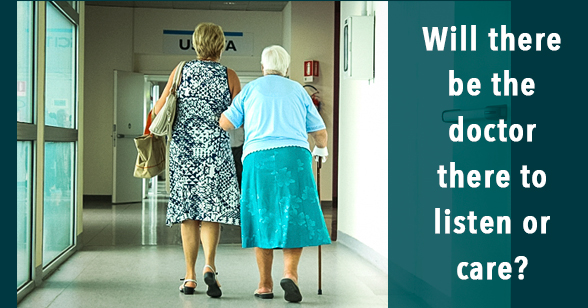I go on Medicare November 1. I am mostly worried that doctors will not provide me with the care that I will need over time. I know that old women do not get the attention or ear of their mostly male doctors. I know because for the past forty years, I’ve been taking older women to doctors and have watched as they have been methodically dismissed, unexamined or otherwise not heard.
I was reminded of this today, when I took a 73-year-old woman to a new doctor for the first time. The visit was less than 10 minutes, and I was reminded how little doctors delve into the realities of older people with lots of chronic problems.
This woman needed me to go into the doctor’s office with her, because she is unable to remember her own history. She also has trouble word finding, forming sentences and is forgetful from moment-to-moment. She knows it’s happening, but doesn’t recall when it started. And, it’s frustrating her to no end. She keeps asking, “What is going to happen to me?”
A widow with no family. she has no support. I did find a a woman in Oakland who knew her years ago, and when I called her, she told me that she hadn’t seen her in years, but occasionally they do talk over the phone. Her friend believes it was 7-8 months ago when her words became jumbled and conversations changed. “She was different.”
Socially isolated and COVID afraid, “something” happened, and there is no medical record of it, anywhere.
She did tell me that one night she panicked, and called 911. The ambulance took her to the hospital, where she was given a prescription for fungal cream, “the kind you’d get for athlete’s foot.” Except, there was nothing wrong with her feet.
So, by the time she called Share the Care, all she knew was that she needed “HELP!” But, she couldn’t articulate why.
Today’s doctor wouldn’t let me in the examining room. She asked that I accompany her, but he said COVID restricted the number of people in the room. I explained to the nurse that this woman has a cognitive problem, and is not a good historian. I went outside to wait. Ten minutes passed. I also wanted to tell him what I’d observed over the last month of visiting her.
When I returned to the waiting room, the receptionist opened the window and told me that the appointment was over, and that she needed to return in two weeks. A blood test had been ordered.
That’s all.
I asked to speak to the doctor. I watched her hesitate. I insisted that I speak to the doctor. He told me he had examined her. I asked again, “Examined?” I asked whether he looked at her skin? There was a rash all over her trunk. I asked whether he’d notice that she cognitive deficits. I asked about her body pain. And whether she had mentioned her high anxiety and low depressions. He reiterated, “I am the doctor.” That’s when I asked him whether he saw her medications, which were still in my purse. He took them from me and went into his office. Apparently, he didn’t.
The exam wasn’t anything I would settle on for myself at any stage in my life.
But, if I am not able to advocate or pursue my own medical care, who is going to do so for me?
He called for her to return to the examination room. This time she was in there a little longer, and he made two referrals to two specialists. But, he didn’t return to talk to me about what he’d found or thought about her condition.
On the car ride home, I asked her what she talked about with the doctor. She said she didn’t know. That she told him that she hurt, but that was about all. “I kept asking for you to come into the room, but that doctor wouldn’t let you,” she said.
I told her that the doctor had ordered a fasting blood test. We’d go together in a few days to get one. She asked what they were looking for … I answered, “I don’t know, one of the things could be diabetes.”
“Oh,” she said. “I already have diabetes. I used to take medication for it. But I don’t have the pills anymore.”
There is so much more to talk to the doctor about, so many unanswered questions.
We do not have a board-certified geriatric physician in Napa county. Not a single one. And yet we have thousands of geriatric patients.
That’s what I worry about the most. The perfunctory ten minute visit that works for me today, because I’m still mentally able to understand and research my own care regime, will not work for me in my 80’s, when I forget, can’t explain things or hurt all over with no explanation.
And, who will be the doctor there to listen or care?


Leave a Reply
You must be logged in to post a comment.